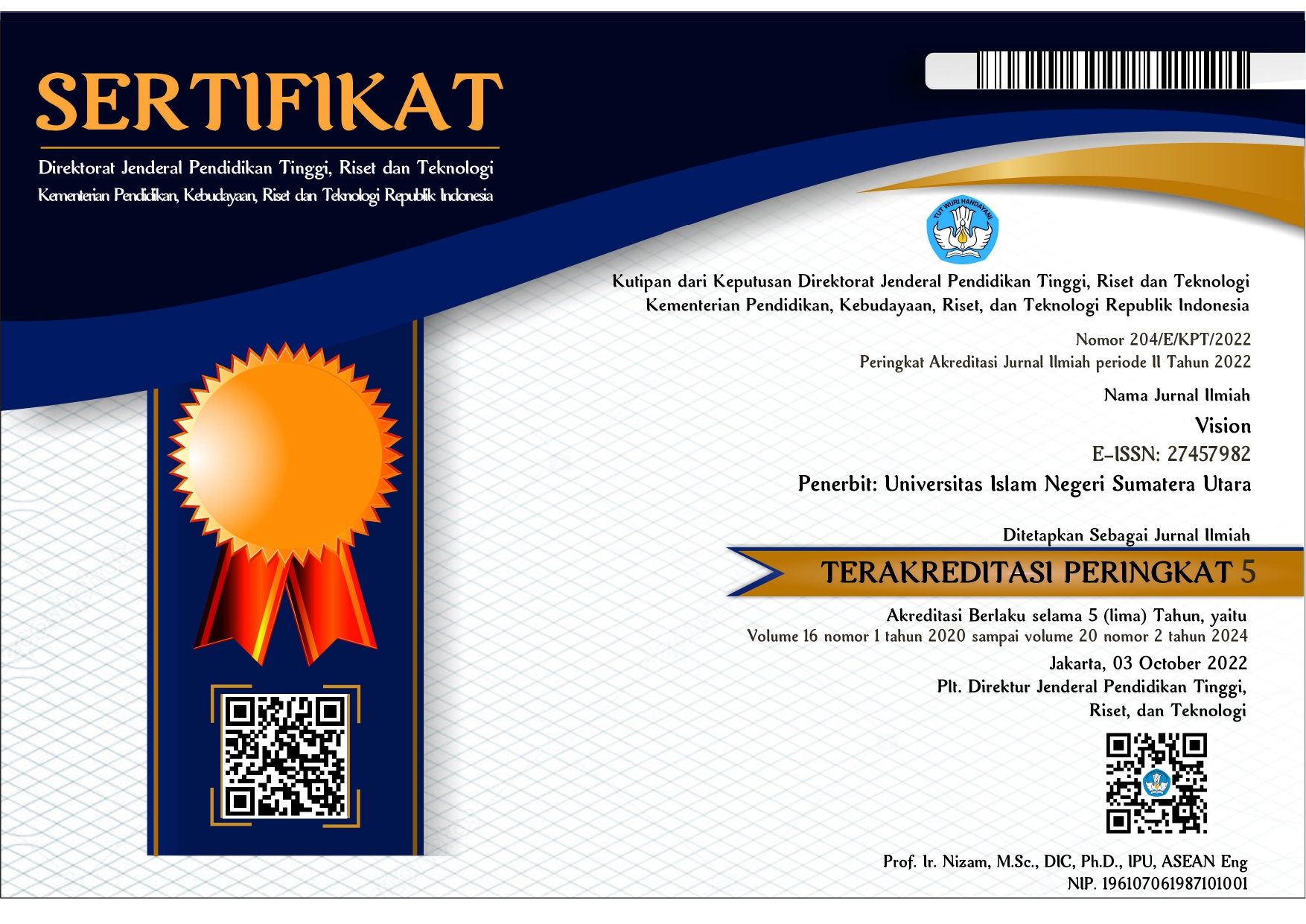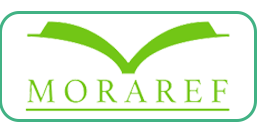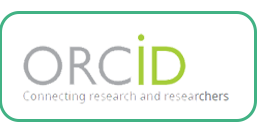THE IMPLEMENTATION OF ENGLISH TEACHERS’ AUTHENTIC ASSESSMENT IN JUNIOR HIGH SCHOOLS
Abstract
A descriptive study was performed at SMP Negeri 1 Kotapinang to measure the perceived ability of English instructors regarding authentic assessment. The research process employed surveys, interview guides, and observation. Both interactive and descriptive models were employed to analyse the data. The assessed expertise of the English teachers at SMP Negeri 1 Kotapinang regarding the implementation of authentic assessment was commendable. Educators utilised portfolios, projects, peer evaluations, performance assessments, and observations as authentic assessment methods. The perceived comprehension and implementation of project evaluation and peer/self-assessment reveal disparities. Authentic assessment is executed differently in online education than in traditional classroom instruction. The educators implemented specific modifications, including assessing the students' attitudes in the classroom. The observation of attitudes in online learning was adjusted based on students' engagement in the course and their assignment responsibilities.
Keywords
Full Text:
PDFReferences
Aldabbus, S. (2018). Project-Based Learning: Implementation & Challenges. International Journal of Education, Learning and Development, 6(3), 71–79.
Azarnoosh, M. (2013). Peer assessment in an EFL context: attitudes and friendship bias. Language Testing in Asia, 3(1). https://doi.org/10.1186/2229-0443-3-11.
Chang, B., & Kang, H. (2016). Challenges facing group work online. Distance Education, 37(1), 73–88. https://doi.org/10.1080/01587919.2016.1154781.
Fahim, M., & Jalili, S. (2013). The Impact of Writing Portfolio Assessment on Developing Editing Ability of Iranian EFL Learners. Journal of Language Teaching and Research, 4(3), 496–503. https://doi.org/10.4304/jltr.4.3.496-503.
Fitri, H. (2017). The Implementation of Authentic Assessment Skills by English Teachers in English Instruction Based On Curriculum 2013 in Academic Year 2016/2017. The State Islamic Institute of Surakarta.
Gulkers, J. ., Bastiaens, T. J., & Kirschner, P. A. (2004). A Five-Dimensional Framework for Authentic Assessment. Educational Technology Research and Development, 52(3), 67–86.
Hadkaew, P., & Liewkongsthaporn, W. (2016). Developing Students ’ 21 Century Skills through Project-Based Learning : Mathematics Teachers ’ Perception and Practice. SEAMEO Conferences, 20–21. https://doi.org/10.13140/RG.2.1.2124.8406.
Hanardi, L. (2015). A Project-Based Assessment Model of English for Senior High School Grade X. Indonesian Journal of English Language Studies, 1(1), 70–92.
Hargreaves, E. (2005). Assessment for learning? Thinking outside the (black) box. Cambridge Journal of Education, 35(2), 213–224.
Huang, J. (2012). The Implementation of Portfolio Assessment in Integrated English Course. English Language and Literature Studies, 2(4), 15–21.
Jamrus, M., & Razali, A. (2019). Using Self-Assessment as a Tool for English Language Learning. English Language Teaching, 12(11), 64-73.
Kavlu, A. (2016). Project – Based Learning Assessment Methods Comparison in Undergraduate EFL Classes of Social Sciences & Educational Studies. International Journal of Social Sciences & Educational Studies, 1(4).
Marhaeni, A. A. I. N., & Dantes, N. (2014). Toward Authentic Language Assessment: A Case in Indonesian EFL Classrooms. The European Conference on Language Learning, 1–0.
Marhaeni, A. A. I. N., Dantes, N., & Paramartha, A. A. G. Y. (2018). Teacher Assessment Literacy: Discrepancies in Authentic Assessment Practice in EFL Context. Proceeding Book of 1st International Conference on Educational Assessment and Policy, 2, 18–21. https://doi.org/10.26499/iceap.v2i1.90.
McKay, P. (2006). Assessing young language learners. Cambridge University Press.
Miles, B., Huberman, M., & Saldana, J. (2014). Qualitative Data Analysis: A Methods Sourcebook. SAGE Pub.
Mueller, J. (2005). The Authentic Asessment Toolbox, Enhacing Student Learning Through Online. MERLOT Journal of Online Learning and Teaching, 1(1), 1–7.
Muryanti, V. (2017). Project-Based Assessment Models for Senior High School Grade XI. Indonesian Journal of English Language Studies, 1(2), 183–206.
Newmann, F. M., King, M. B., & Carmichael, D. L. (2017). Authentic Instruction and Assessment. In Department of Education. State od Iowa.
Nkhoma, C., Nkhoma, M., Thomas, S., & Le, N. Q. (2020). The Role of Rubrics in Learning and Implementation of Authentic Assessment: A Literature Review. Proceedings of the 2020 InSITE Conference, January, 237–276. https://doi.org/10.28945/4606..
Quansah, F. (2018). Traditional or Performance Assessment: What is the Right Way in Assessing Leaners? Research on Humanities and Social Sciences, 8(1), 21–24.
Ratminingsih, N. M. (2014). Pengembangan model pembelajaran bahasa inggris induktif berbasis lagu kreasi. Jurnal Ilmu Pendidikan, 20(1), 47–58.
Sridharan, B., & Mustrad, J. (2016). Authentic Assessment Methods: A Practical Handbook for Teaching Staff. Deakin University. https://doi.org/10.13140/RG.2.1.2358.7921.
Suarimbawa, K., Marhaeni, A. A. I. N., & Suprianti, G. (2017). An Analysis of Authentic Assessment Implementation Based on Curriculum 2013 in SMP Negeri 4 Singaraja. Journal of Education Research and Evaluation, 1(1), 38–45.
Suwaed, H. (2018). FL Students’ Perceptions of Using Portfolio Assessments in the Writing Classroom: The Case of Libyan Undergraduate Second Year Students. Journal of Studies in Education, 8(2), 144–156.
Verkade, H., & Bryson-Richardson, R. (2013). Student Acceptance and Application of Peer Assessment in a Final Year Genetics Undergraduate Oral Presentation. Journal of Peer Learning (Online), 6(1), 1–18.
Wahyuni, L. G. E. (2013). Authenticity of Teachers ’ Made Assessment and Its ’ Contribution to Students ’ English Achievement. Jurnal Pendidikan Dan Pengajaran, 46(2), 182–191.
Widhanarto, G., Chotimah, S., & Indrianingsih, Y. (2018). Implementation of Online Learning Daily Evaluation in Higher Education. Lembaran Ilmu Kependidikan, 47(2), 40–44.
Wiliam, D. (2013). Assessment : The Bridge between Teaching and Learning. Voices from the Middle, 21(2), 15–20.
DOI: http://dx.doi.org/10.30829/vis.v20i2.4109
Refbacks
- There are currently no refbacks.
Copyright (c) 2024 VISION
















